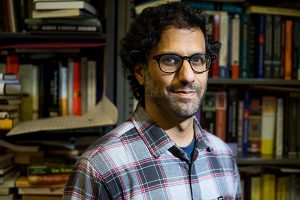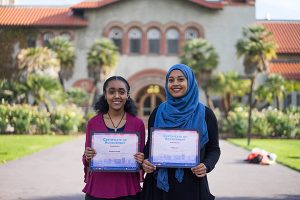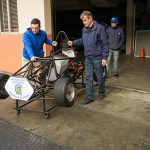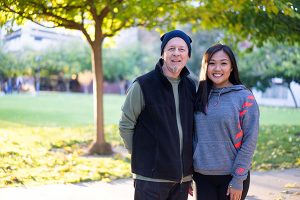
Photo: James Tensuan
Philosophy Professor and Director of the Center for Comparative Philosophy Anand Vaidya will launch the Spring University Scholar Series on February 21.
By Melissa Anderson
Professor of Philosophy and Director of the Center for Comparative Philosophy Anand Vaidya and Associate Professor of Communicative Disorders and Sciences Nidhi Mahendra have more in common than participating as speakers in this spring’s University Scholar Series. They both discovered a passion for their academic specialties as undergraduate students and remain just as enthusiastic – though much more experienced – today.
Vaidya will launch the spring 2018 University Scholar Series with a lecture entitled, “The Project of Cross-Cultural and Scientifically Informed Critical Thinking,” on Feb, 21, from noon to 1 p.m. in the Dr. Martin Luther King, Jr. Library 225/229.
Vaidya first discovered philosophy as a freshman at Humboldt State University when he took classes on medieval philosophy and logic and critical thinking.
“Without hesitation, I can lay blame for my passion for philosophy on the two classes that changed me from a chemistry major to a philosophy major and rewired my whole orientation toward learning,” he said. “I have been fascinated with the nature of logic and critical reasoning ever since.”
Since then, he has engaged in thinking about the subject from the perspective of philosophy of mind, cognitive science, epistemology and comparative philosophy. His most recent interest in cross-cultural and multi-disciplinary approaches to logic and critical thinking arose when he read journalist and friend Jessica Kraft’s article in The Atlantic about hip-hop as a technique in college debate.
“The article led me to inquire into the way I teach logic and critical thinking, and whether I was unintentionally excluding some people from engaging in critical thinking simply through the method by which I was teaching them,” he said.
He began to research non-western philosophy traditions, traveling to India, New Zealand, Hawaii and Japan during a sabbatical.
“I found there were all sorts of contributions we are neglecting because of how a university structures the dissemination of knowledge to students,” he said. “We typically don’t talk to one another and share knowledge in ways that can improve learning.”
Vaidya sees San Jose State University as a place that can pioneer the development of a new critical thinking model that is informed by a cross-cultural investigation into tools from traditions as distinct as Arabic and Zen philosophy.
“We have a unique opportunity to do this because we have a diverse student population that can engage in the very construction of this new model, and because our connection with technology in Silicon Valley provides us with an opportunity to actually build tools, such as smartphone applications that can help our students learn and engage in better critical thinking,” he said.
Nidhi Mahendra, an associate professor of Communicative Disorders and Sciences in the Connie L. Lurie College of Education, will present the second University Scholars Series lecture on March 21, from noon to 1 p.m., in MLK 225/229. Her talk is entitled, “Neurological Accidents – Brain, Behavior and the Power of Rehabilitation in Alzheimer’s Disease and Stroke.”
She has been working clinically, conducting research and teaching with persons with neurological disorders such as Alzheimer’s disease and stroke for 20 years.
“I remember that right from my first year in college, I was just so excited when I started to learn about the brain and how it defines who we are,” she said. “That interest only grew over time and has not waned one bit.”
In her lecture, she will share research on the power of rehabilitation for patients with communicative disorders following a stroke or due to Alzheimer’s disease. She recalls that as an undergraduate she observed a patient who had a stroke and lost the ability to talk and walk overnight.
“I remember being so moved by the experience and thinking about how I might be able to help,” she said, noting that her interest in dementia also has a personal connection as one of her grandparents developed the disorder after suffering from mini strokes.
“We are an aging nation, part of a rapidly aging globe and have to be part of a robust movement to celebrate that and support our seniors,” she said, noting that health conditions, changes, compromises and disorders are part of the human condition. “It can happen to any of us; therefore, as communities and societies, we must affirm the place and dignity of all people and retain our positivity for what they can do if excellent care is provided, despite them having a disorder or condition.”
The final speaker of the series will be Assistant Professor Xiaojia Hou, History, College of Social Sciences, who will present “Negotiating Socialism in Rural China: Mao, Peasants and Local Cadres in Shanxi,” April 18, noon to 1 p.m., Dr. Martin Luther King, Jr. Library 225/229
All lectures are free and open to the public. Lunch will be provided. See fliers for more details on the series.






